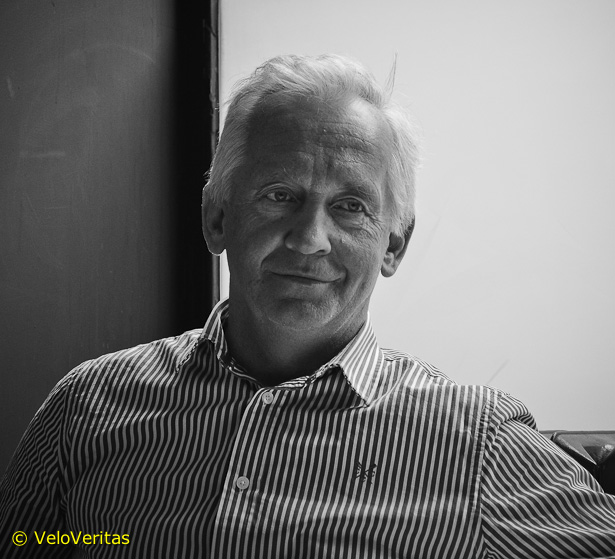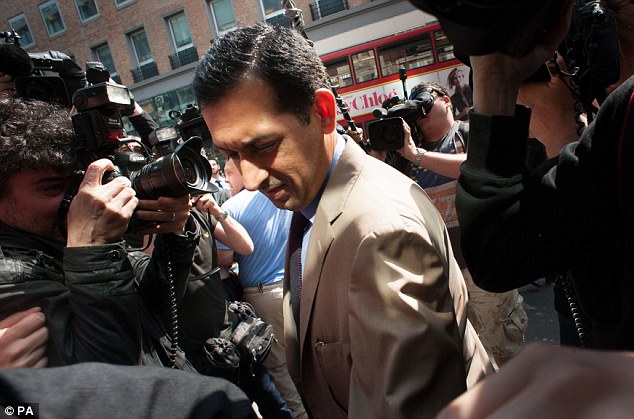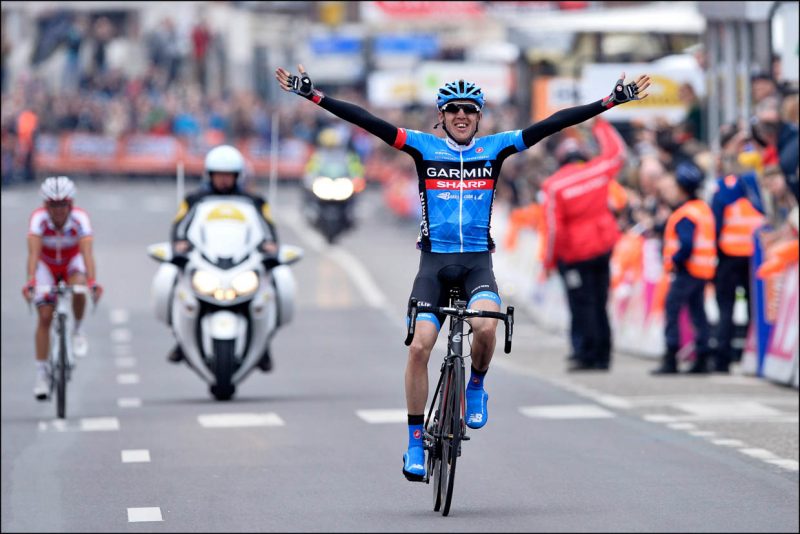In part one of the interview respected and award-winning Irish journalist David Walsh discussed his interest in Lance Armstrong’s motivation, his willingness to take part in a lobby of Irish cycling clubs to call for an EGM so that Pat McQuaid’s nomination for a third term as UCI President was not backed, and recounted some startling stories including one about Johan Bruyneel shooting up with cortisone just for fun.
Here in part two Walsh tells us about his time spent with Team Sky during their training blocks in Tenerife, what’s happening with the action group “Change Cycling Now” and exactly what he thinks about Garmin rider Dan Martin’s win in Liège last Sunday…

* * *
On Doping
With Team Sky taking the wins they have – and you’ve been spending a lot of time with them in their training – do you feel that the sport really is in far better shape nowadays?
“I do think the sport is, in a general sense, healthier now than it has been for some time.
“I mean Dan Martin’s win in Liège-Bastogne-Liège was a great thing for the sport, and he’s made a lot of good progress this year, his win in Catalonia showed his form, and was just great.
“He rode a really good race in Liège last year, it’s not like this has come out of nowhere. So that was encouraging.
“I’ve spent about three weeks with Team Sky this year so far, and everything I’ve seen about them indicates that they’re clean. It’s not proof that they’re clean, and I’m not saying that they’re clean, but nobody has come up with any evidence that they’re doping, nothing.”
USPS were declaring a great deal more medical kit to the Tour de France organisers than other teams were. I wonder if there’s any mileage in asking teams like Sky not just to declare the contents of their medical chest at the big races, but to publish them?
“Yes, absolutely.
“I think that would be a great thing to do. That’s a really good point – and in fact I’m going to ask Sky to do that.
“I’m going to say ‘give me a list of all the medical products you’re carrying and tell me what it’s for. I will do that at the Giro, I’m there from the 13th of May and staying on the race until the end.
“Brailsford was involved with the track team for eighteen years, and no one really said that they were doing it in any way other than correctly, and I don’t believe after all that time he would suddenly change his ethics.
“I was with some of the Sky guys in Tenerife when they were training this year, and they didn’t bring any medical personnel, none. And when you consider that Ferrari was the key man for USPS in Tenerife…”
Do you feel that there is a place in the sport for guys like Levi Leipheimer, who received the reduced USADA ban for cooperating, but nonetheless admitted to doping for pretty much his entire career?
“Well, there is a difference between the guy who admits to doping, and the guy who tries to blame a false positive or use some other excuse to try to minimise his responsibility.
“I think there’s a case to be made regarding USADA giving all those riders who admitted their doping a reduced ban; they volunteered their information, and would not have received any ban if they had done nothing, it wasn’t like they were caught – they weren’t, so I think they did deserve a significantly reduced ban.”
Do we view things differently to other nations do you think? We see Richard Virenque still being fêted at the Tour where he’s a commentator for Eurosport, and Johan Museeuw still carries an aura and is so popular in Belgium…
“We have the old ‘Anglo-Saxon, puritanical view’ – but it’s not our problem, it’s their problem.
“What they’re saying is that if someone decides to not play by the rules and then gets screwed, that’s okay.
“But we can never say that’s okay – it’s not okay, it’s wrong. Totally wrong.”
When we drive the stage at the Tour what strikes us is the many people at the side of the road, their tables laid out with the bread and wine and cheese, the families who come together to see the race passing their house… they don’t really care about the doping problem or the result; it’s the show they’re there for, the occasion.
“I think through the last survey that ASO did they discovered that 25% (and this figure is rising each year) of the people who go to see the Tour de France passing are primarily there to see the publicity caravan.
“That number is huge, and ASO are very mindful that as well as everything else, the Tour is a show.
“But you know, if we are to treat it as a legitimate sporting event as well it has to have integrity.
“Professional sport has a way of destroying much of what drew us into sport in the first place, but that’s always been the case.”
Do you reckon the testers are still two years behind the cheats?
“I always think of it as the analogy of the pursuit on the track. On the one side you have the dopers and their facilitators and on the other the testers.
“No matter how fast the testers go, the dopers go just that little bit faster to maintain their advantage. It’s a never-ending pursuit.”
And now we’re hearing about the black-market drugs, maybe coming out of China, not even completed clinical trials but finding their way into the hands (and bodies) of athletes…
“Yes, but at the same time we’ve got the biological passport, reduced speeds… so there are some positive signs.
“I’ll believe the manufacturers putting markers into their products to assist anti-doping when it happens; it’s such a big business. The EPO manufacturers were never going to do that because a significant amount of the product is being sold into the sporting market.”

* * *
On Change Cycling Now
In theory an admirable collection of like-minded, frustrated, cycling lovers. In practice though, it hasn’t altered the landscape much. Why not?
“I just don’t believe it had a means to do so.
“Jamie Fuller [CEO of Skins Compression Clothing] has done sterling work to try and get out there and change things, but he just hasn’t succeeded. Perhaps it was never going to.
“It was admirable and it was very well-intentioned, but I just couldn’t see how it was going to achieve change.
“They weren’t ‘inside the tent’ of administrative cycling so therefore we weren’t going to be able to turn up at a UCI Management Committee meeting and say ‘guys, Pat and Hein have got to go’.”
You’re talking about the group in the past tense, is it finished?
“I don’t hear anything more about it, I don’t hear that it’s going anywhere, but I don’t mean that as a criticism of Jamie, I think his heart was very much in the right place; he has all the right ideas.
“If you were to tell me that Pat McQuaid had decided to step aside and that he had persuaded Jamie Fuller to be the new president of the UCI I’d say ‘good, that’s a good change’.
“But then if Pat decided to go and he nominated a hundred people, any one of whom could be installed in his place, I’d consider that a good deal. I hear names of people who may be interested…”
I’ve heard British Cycling’s Brian Cookson’s name may be in the hat…
“When Lance admitted on the Oprah interview that the Emma O’Reilly claim about the ’99 cortisone cover-up was in fact true, I heard Brian Cookson say in a TV interview that ‘obviously people in the UCI were – at best – looking the other way’.
“So Brian, how can you work with people who covered up for the Tour de France winner?
Jonathan Vaughters presented an article which set out ideas for improving the professional sport, including the teams giving a larger percentage of their budget towards anti-doping and receiving a share of the revenues, as well as others propositions. Do you think these suggestions have any merit?
“Oh yes. Jonathan is a bright guy that I would always listen to.
“Again, if someone said that Jonathan was going to leave his team role at Garmin and become President of the UCI I would regard that as positive.”
What do you think of Greg LeMond’s idea of using power measurement as a means of anti-doping?
“That’s how Team Sky monitor their own riders.
“Tim Kerrison and Dave Brailsford know – to a minute level of detail – what power output of their riders is capable of producing and if riders exceed that to a significant degree, well that’s an alarm.
“I actually experienced that myself, towards the end of Paris-Nice. I was with Tim and he spoke with Ritchie Porte before the time trial up Col d’Eze. Tim was trying to reassure Ritchie that he would be able to do what was needed to win, and he said to the rider ‘Look. On that climb, you’re capable of a power output of 400w, and if you do that it should be good enough’.
“For the first half of the time trial he was sitting at 413w, and for the second half it was something like 387w. It actually averaged out at bang-on 400w, and that’s what Porte does in training all the time, they knew that was his capability. If he’d produced 430w average that would have rung alarm bells. Tim says ‘we like to think that we know what power output we have to produce to win the race’.
“They do a lot of recon, but they missed a fair bit of recon for the Giro because when they visited earlier this year, Wiggins and some other riders, they missed two days because they couldn’t get up the climbs because of the snow.”
* * *
What’s Next?
You said last night at your talk in Edinburgh’s Lyceum Theatre that ‘the journey is nearly over’, but with the doping investigations in Italy and Spain still not concluded, the USADA cases against Bruyneel et al to be heard, the new Chinese drugs being found, it feels far from over.
“That’s true, it’s going to go on.
“Even today I woke up to the news that the biggest operation in British racing, Godolphin, the biggest player in world bloodstock, has been shown to be systematically doping its most valuable race horses. That’s a big story and I’m going to have to write about it this week, but I’m looking forward to it.
“It’s not about doping in cycling but it is about integrity in sport and being able to believe what you are seeing.
“The problem with Godolphin doping their horses is that if you were a small trainer and you’ve got ten horses, chances are you don’t have enough resources to dope. That was always the problem in cycling; people with the big contracts went to Michele Ferrari – if you had a small contract Ferrari didn’t want to know you, because you wouldn’t be able to pay him enough for his trouble.
“His fee was 15% of your salary, so if a rider was on 200 grand that meant 30,000 to Ferrari, totally worth his bother. And Lance paid him over a million, according to the records.
“But for me doping in sport will never be over because I think people will always seek an advantage and my motivation will always be to protect the guy who doesn’t want to dope or who just wants a career and to do it properly, the guy who’s got a sense of morality, he’s the guy we have to take the side of.”

Do you think it’s sad that youngsters who are into cycling today know about blood vector doping and Hct percentages, or do see it as necessary education to help them avoid the errors of their elders?
“I see it as totally necessary.
“I think young, talented riders should never turn up at a team and not know what’s being put into their bodies or not knowing what’s beign suggested to them, in relation to performance enhancing.
“They should know, and they should be very mindful and know exactly what’s in every product that they are given.
“USPS use to try out their young riders in the ‘States by giving them little supplements that were legal. They would see the reaction of the kid who’d been given the supplement. If the guy said ‘What’s in this? What’s it made of and what’s it going to do to me?’ well he probably wasn’t going to be going forward to the senior team. If they got a kid that gulped it down without thinking or questioning that kid had promise. On the pharmaceutical level, he was the kind of kid they were looking for.
“That was Bruyneel and Armstrong’s policy, that’s what they did. USADA found this out; they were basically grooming young kids… horrendous.”
Knowing this, and all the other things we’ve covered this morning, how do you retain any kind of enthusiasm for the sport? Were you leaping off the couch on Sunday afternoon when Dan Martin jumped Rodriguez going up the Rue Jean Jaurès to win in Liège?
“I didn’t watch Liège live, but I recorded it and sat down in the evening to watch it, and I absolutely loved it! I may not have loved it quite so much if somebody else had won!
“But I believe in Dan Martin – it’s not just because he’s Irish (because he’s not really!), but his mum is Irish and I love the fact that he wants to race for Ireland.
“I thought he timed it so well, perfectly… he was keeping an eye on the guys chasing and needed to get the jump just right. He didn’t look like he had incredible power when he made his last acceleration but it was just enough to get home clear.
“So I’ve no trouble with enthusiasm – but I’ve no trouble with skepticism either.”

You’ve mentioned the Giro, are you going to cover the Tour as well?
“Yes I am, I’m going to both races with Team Sky – hopefully we won’t fall out.
“Someone has described me on Twitter as ‘Sky’s bitch’ [laughing], which has got some unpleasant connotations – but I was made a really interesting offer from the team, I’ve really enjoyed my time with them, and from what I’ve seen I’ve got the impression that this team does not have a doping programme, in my view.
“That isn’t to say that some rider in the team may be ‘freelancing’ on an individual basis, or maybe more than one is behaving independently of the team, but it’s not team organised.
“I have zero doubt about Tim Kerrison’s ethics, and those people who say ‘Sky’s success makes them suspicious’, well at least they should be less suspicious after this year’s classics campaign! They got it wrong; training guys like Bernie Eisle and Matt Hayman up mountains didn’t really work.
“Ian Stannard was excellent in Milan-San Remo but apart from that what did they have?
“So, if anyone out there has proper evidence about Sky cheating, well, I’m a journalist and I would love to hear it.”
Check out part one of David’s interview.



